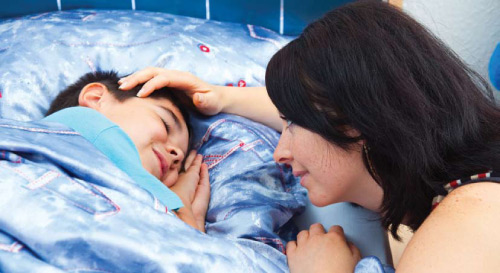Bedwetting, also known as nocturnal enuresis, is a very common complaint among parents and can raise serious concerns for both children and parents. It occurs when your child’s brain fails to send a signal to his bladder to hold the urine while sleeping. For children, the embarrassment and guilt can damage their self-esteem while parents may worry endlessly about their child’s development. However, just like walking and talking, children will reach each developmental milestone at their own pace.
|
Statistics: |
Bedwetting Facts
- It is not a behavioural problem. Children do not wet their beds because they are too lazy or scared to go to the bathroom.
- Bedwetting is genetic. If both you and your spouse have a history of bedwetting as children, your child might be about 70% more likely to suffer from the same problem.
- Emotional link. Stressful events for children such as moving, welcoming a new sibling and starting school may also trigger a period of bedwetting after months or years of achieving bladder control.
- Many more boys than girls wet their beds.
- It will stop. Most children will be able to control their bladders throughout the night by puberty.
Coping with Bedwetting
Your child will eventually grow out of bedwetting, but until then, here are a few methods that might ease the experience and prepare your child for the next stage:
- Empathise with him.
Steer away from punishing or criticising your child. Instead, let him know that other people (including yourself ) had experienced it as well when they were younger. Your child will be comforted by the fact that there are other people who have struggled and dealt with it successfully. - Regulate drinks at night.
While it may not be able to completely prevent the occurrence of bedwetting, cutting back on caffeinated drinks (ie chocolates, carbonated drinks) and water about 2 hours before bedtime can be helpful. This is because caffeine increases the rate of urine production. - Regular routines.
This includes using the bathroom before getting into bed and setting a standard time for them to get into bed. When your child sticks to a schedule, you are indirectly training his bladder to be emptied at appropriate times. - Be prepared.
Protect the bed by using a waterproof mattress or lining the mattress with a waterproof sheet. Place a clean pair of pyjamas and bedsheets nearby so that both you and your child can quickly change and go back to sleep if he wets his bed. - Celebrate dry nights.
Praise your child and give him an encouragement or two when he has a dry night. This will make him feel good and confident to continue his dry-run. However, be careful not to overdo the celebrations.
|
Doctor Needed! If your child continues to wet his bed after the age of seven, or suddenly starts wetting the bed again, it may be a sign that he may be suffering from a health problem or is emotionally disturbed. In the face of such event, bring him to the doctor for a check-up. |






Comments